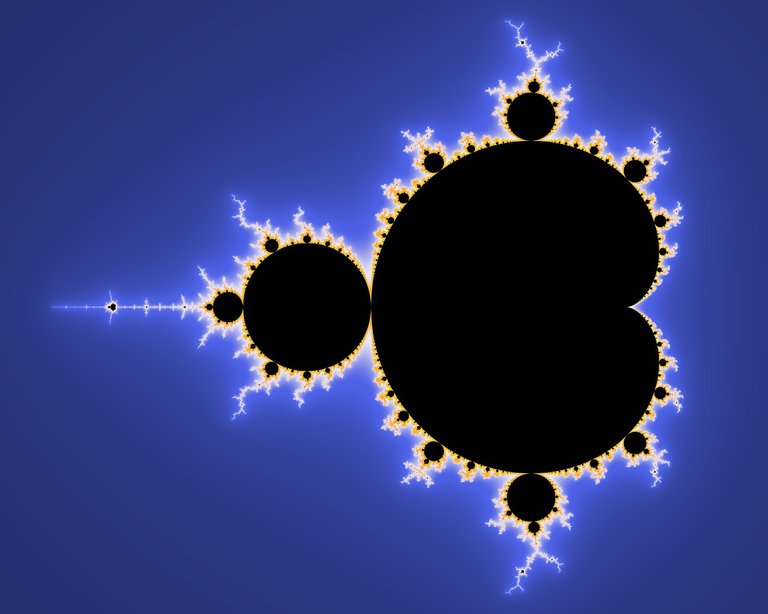How to prove Math is cool
By writing this post, my purpose is to get rid of some misconceptions about Mathematics, to show its beauties and to prove it isn't so bad; the article is also intended to make you learn a little of mathematical reasoning.
In order to do that, I'll use a simple language with some technical reference, I'll show one of the most elegant examples of what math actually is and by a pseudo-formal reasoning I'll prove Math is cool.

Mandelbrot Set: the "heart" of Mathematics 💖
Before you start reading, keep in mind that...
- You're a Mathematician! You're proving something!
- You have to use all your intuition and imagination! And then demonstrate!
- When you try to crack the problem, you should write down everything you think (everything!), then you judge if the idea was brilliant or silly.
- It's good practice to have fun along with struggling (poor mathematicians… 😔)
Declare our purpose
As soon as you feel comfortable with your new identity of mathematician, you should start to state what you want to demonstrate; that's our conjecture.
"Mathematics is cool"Th. (Thesis)
Translate Th. in mathematical language
Let's define the following function:
C(Tn) = coolness of TnP.1 (Property 1)
Where Tn represents the nth topic of Mathematics
By P.1, we can rewrite Th. as follows:
C(Tn) > 0∀ n ∈ ℕ
What did we just do?
We defined the property P.1 that represents the coolness of the nth topic of Mathematics, we also defined the nth topic cooler than the (n - 1)th topic. So the grater is n, the greater is the coolness of Tn; it is like saying "the more you go in dept in math and the more you discover cool things".
The Proof
In proof theory, a demonstration needs, to be valid, a correct mathematical proof; and a method to get it.
In this case, we'll take advantage of Mathematical induction principle[1], because it is almost always used to demonstrate that a property holds for every natural number.
To keep it simple, you need to check two things (cases):
- If the property is satisfied by a reasonable number, which is usually 0.
- If the property is satisfied by a general natural number "n" and "n+1"
If the two conditions are met, then the property is satisfied by all the natural numbers greater than or equal to the starting number.
Base Case: The Mandelbrot Set
We need to find the natural number for the first case, this case has got a name, the "base case". And our base case will be a super cool topic: the Mandelbrot Set.
The Mandelbrot Set is mostly know due to its representation on the complex plane, because it is a particularly suggestive fractal. A fractal is geometrical shape that repeats a part of itself infinite times, and the repetition gets gradually smaller, infinitesimal; this property is called "self similarity".
What's inside Mandelbrot?
Another Mandelbrot! As I told you, fractals auto-replicate in a very similar form, but Mandelbrot is special because it has got super fascinating spirals!

Zoom in Mandelbrot Fractal[2]
Relations with other sets and fractals
One of the most unexpected things about Mandelbrot Fractal is that you can find it in other famous fractals!
As an example, the Collatz Fractal is related to one of the most difficult open problems of our time: the Collatz Conjecture. Open problems are generally unsolved demonstrations of conjectures or hypotheses, they haven't to be necessarily true, it is just needed to demonstrated if they're always valid or not.

The Collatz Fractal: do you see our Mandelbrot?
There is another wonderful fractal containing Mandelbrot Set, it is the Julia Set Fractal. This set has got a complementary set: the Fatou set. Julia is a "chaotic" set, whereas Fatou is "regular"; but neither of them is unique there exist infinte Julia and Fatou sets.

An animation of similar Julia Sets Fractals, of Maxter315
In the end?
I think it is unnecessary to say that such a beauty is also tremendously cool, we just demonstrated our base case.
Are you sure...?
Now we know that Mandelbrot is cool, but we actually don't know the starting number n0!
Do you remember the first definition of Mandelbrot I gave you?
I told you it is the "heart" of Mathematics: the "heart" of a set of topics has necessarily to be the first topic, hence n = n0 = 0.
By our reasoning we found out that:
C(T0) > 0
Induction Step
Next, we need to verify the second condition for the second case, it is called the "induction step":
In order to apply the Mathematical Induction, it is crucial to think about a relation between Tn and T(n+1); in other words it is the relation between a topic and the next.
As we know that mathematical topics are strongly bonded together and similar to each other, it's easy to conclude that the next topic, which is the same as the previous but it goes even further, has to be even cooler! (e.g. the Julia and Collatz Sets)
Let's write it in mathematics:
C(Tn) > C(Tn - 1)∀ n ∈ ℕ
Conclusion
This is what we got:
C(T0) > 0
C(Tn) > C(Tn - 1)∀ n ∈ ℕ
Do you see it?
We know that the first topic is cool and any topic is cooler than the preceding, thus we know that all topics are cool in Mathematics and they became way cooler the more you go forward, by Mathematical Induction we demonstrated Th; now it is a Theorem.
To summarize…
- We declared what we wanted to demonstrate
- We defined a property in order to write the thesis in formal mathematical language
- We got some intuitions
- We demonstrated it by Mathematical induction
- We got a theorem
Final Notes
So, maybe probably someone is arguing that my theorem isn't demonstrated and so on… And they're right, my theorem isn't demonstrated at all, but it wasn't intended to. I wanted to make you see mathematics in a different way, to put to your attention some of its beauties, to give you a model of mathematical thinking and problem solving, in a new, fancy manner.
Obviously that math is cool isn't a matter of fact but it's absolutely real for somebody.
Let me know in the comments if you love math now! So my theorem is demonstrated!
𝕄4th3m4t1c4l ℝ3g4rd∫
- Check out Mathematical Induction on Wikipedia ↩
- I wasn't able to upload the original gif from Wikipedia, hope someone could fix this. ↩
Are mathematical topics countable though. In addition, the sequence you generate does not have to be monotone with respect to C :o)
When I imagined a way to demonstrate the theorem I did many attempts and I chose the one that sounded the most natural (because saying that the more you go in dept in Mathematics the more cool it becames sounded natural to me), but if you have an alternative solution please tell me! It was the purpose of the article to make all of you think and imagine!
Anyway I know that Mathematical topics are countable but I though that if I would have stated that there are, let's say, 10 topics in mathematics, someone else could argue that there 11 topics because he counted them in another manner; so I preferred to keep it general, without numbers.
In the end, even if all would have accepted that there are 10 topics in mathematics what would you do with that? Basically you have to demonstrate that C(Tn) > 0 ∀ n of N. But I don't see any advantage by knowing the exact amount of topics...
But, as I have already said, if you have another answer I happy to hear that!
Posted using Partiko Android
My reply was meant as a non-serious reply. Don't take it too serious. ^-^
The monotonicity comment was about the property C(Tn)> C(Tn-1). Won't there be topics which are equally cool at some point. :P
It is fun to think about how to define an uncountable topic class. Depending on how you define topic you can do this. You could for example define a topic as a property given to something in set which is or is equivalent to the real numbers :o)
And another thing to think about is why induction is true at all. Because the familiar induction that is used in math relies on arithmetic induction :o)
I'm sorry, from time to time, it happens to me that I don't understand sarcasm (maybe it is due to the fact English isn't my native language)
Anyway mine was a friendly argumentation :)
I totally agree with you about my property C(n), I knew that someone could have noticed this logical flaw! But, as I told you, it was the most "natural" (credible) idea I got.
Oh, yes. I know that not all mathematicians like induction because it can't be demonstrated (in fact it is a principle) and the same they think about Numbers in general!
I know that many mathematicians tried to demonstrate the existence of Natural numbers (because you can demonstrate the existence of other bigger sets (Z,Q...) only assuming that N exists) but it wasn't impossible, so all the existence of all other sets of number isn't demonstrated.
So mathematics needs axioms in order to demonstrate everything.
All the logic of math, is based on something that is supposed to exist but we won't never if it actually exist...
To extend the concept:
Do we exist? Are we talking now? XD
Posted using Partiko Android
Many people do not like math, simply because their thinking is used differently. People who like logical thinking will like math.
When I was in high school, mathematics and physics were my forte, in which my geometry excelled. :) But I did not choose the research path, if I chose, I would probably study physics :) hihi
I hope you will bring math fun to many people through your posts :)
Thanks. I'm glad to see that someone appreciated (and likes math).
I don't know if in my future posts I'll talk again about math, because it took me a lot of effort and it looks like anyone doesn't care much (no problem, it was a kind experiment).
Posted using Partiko Android
Congratulations @fral! You have completed the following achievement on the Steem blockchain and have been rewarded with new badge(s) :
You can view your badges on your Steem Board and compare to others on the Steem Ranking
If you no longer want to receive notifications, reply to this comment with the word
STOPVote for @Steemitboard as a witness to get one more award and increased upvotes!
An interesting and funny approach to the mathematical rigour. I really liked it. To continue with the funny side, please remember that math is cool, but many other fields of science (physics in particular) are as cool.
PS: I didn't say at least as cool on purpose. ;)
I know science is cool (and you're right probably physics it is the coolest of the sciences), in the end I'm scientist too, I study chemistryThanks @lemouth!
Posted using Partiko Android
At the end of the day, we all pursue the same goal: understanding how our universe, at potentially different scales, work :)
This post has been voted on by the SteemSTEM curation team and voting trail. It is elligible for support from @curie.
If you appreciate the work we are doing, then consider supporting our witness stem.witness. Additional witness support to the curie witness would be appreciated as well.
For additional information please join us on the SteemSTEM discord and to get to know the rest of the community!
Please consider setting @steemstem as a beneficiary to your post to get a stronger support.
Please consider using the steemstem.io app to get a stronger support.
I'll join for additional informations, thanks
Posted using Partiko Android